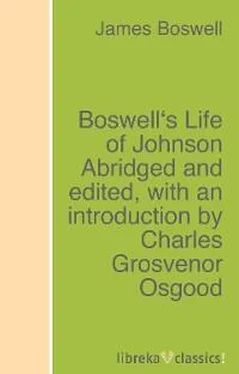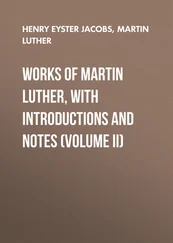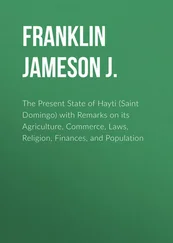James Boswell - Boswell's Life of Johnson Abridged and edited, with an introduction by Charles Grosvenor Osgood
Здесь есть возможность читать онлайн «James Boswell - Boswell's Life of Johnson Abridged and edited, with an introduction by Charles Grosvenor Osgood» — ознакомительный отрывок электронной книги совершенно бесплатно, а после прочтения отрывка купить полную версию. В некоторых случаях можно слушать аудио, скачать через торрент в формате fb2 и присутствует краткое содержание. Жанр: unrecognised, на английском языке. Описание произведения, (предисловие) а так же отзывы посетителей доступны на портале библиотеки ЛибКат.
- Название:Boswell's Life of Johnson Abridged and edited, with an introduction by Charles Grosvenor Osgood
- Автор:
- Жанр:
- Год:неизвестен
- ISBN:нет данных
- Рейтинг книги:4 / 5. Голосов: 1
-
Избранное:Добавить в избранное
- Отзывы:
-
Ваша оценка:
- 80
- 1
- 2
- 3
- 4
- 5
Boswell's Life of Johnson Abridged and edited, with an introduction by Charles Grosvenor Osgood: краткое содержание, описание и аннотация
Предлагаем к чтению аннотацию, описание, краткое содержание или предисловие (зависит от того, что написал сам автор книги «Boswell's Life of Johnson Abridged and edited, with an introduction by Charles Grosvenor Osgood»). Если вы не нашли необходимую информацию о книге — напишите в комментариях, мы постараемся отыскать её.
Boswell's Life of Johnson Abridged and edited, with an introduction by Charles Grosvenor Osgood — читать онлайн ознакомительный отрывок
Ниже представлен текст книги, разбитый по страницам. Система сохранения места последней прочитанной страницы, позволяет с удобством читать онлайн бесплатно книгу «Boswell's Life of Johnson Abridged and edited, with an introduction by Charles Grosvenor Osgood», без необходимости каждый раз заново искать на чём Вы остановились. Поставьте закладку, и сможете в любой момент перейти на страницу, на которой закончили чтение.
Интервал:
Закладка:
I know not for what reason the marriage ceremony was not performed at Birmingham; but a resolution was taken that it should be at Derby, for which place the bride and bridegroom set out on horseback, I suppose in very good humour. But though Mr. Topham Beauclerk used archly to mention Johnson's having told him, with much gravity, 'Sir, it was a love marriage on both sides,' I have had from my illustrious friend the following curious account of their journey to church upon the nuptial morn:
9th JULY:—'Sir, she had read the old romances, and had got into her head the fantastical notion that a woman of spirit should use her lover like a dog. So, Sir, at first she told me that I rode too fast, and she could not keep up with me; and, when I rode a little slower, she passed me, and complained that I lagged behind. I was not to be made the slave of caprice; and I resolved to begin as I meant to end. I therefore pushed on briskly, till I was fairly out of her sight. The road lay between two hedges, so I was sure she could not miss it; and I contrived that she should soon come up with me. When she did, I observed her to be in tears.'
This, it must be allowed, was a singular beginning of connubial felicity; but there is no doubt that Johnson, though he thus shewed a manly firmness, proved a most affectionate and indulgent husband to the last moment of Mrs. Johnson's life: and in his Prayers and Meditations, we find very remarkable evidence that his regard and fondness for her never ceased, even after her death.
He now set up a private academy, for which purpose he hired a large house, well situated near his native city. In the Gentleman's Magazine for 1736, there is the following advertisement:
'At Edial, near Lichfield, in Staffordshire, young gentlemen are boarded and taught the Latin and Greek languages, by SAMUEL JOHNSON.'
But the only pupils that were put under his care were the celebrated David Garrick and his brother George, and a Mr. Offely, a young gentleman of good fortune who died early. The truth is, that he was not so well qualified for being a teacher of elements, and a conductor in learning by regular gradations, as men of inferiour powers of mind. His own acquisitions had been made by fits and starts, by violent irruptions into the regions of knowledge; and it could not be expected that his impatience would be subdued, and his impetuosity restrained, so as to fit him for a quiet guide to novices.
Johnson was not more satisfied with his situation as the master of an academy, than with that of the usher of a school; we need not wonder, therefore, that he did not keep his academy above a year and a half. From Mr. Garrick's account he did not appear to have been profoundly reverenced by his pupils. His oddities of manner, and uncouth gesticulations, could not but be the subject of merriment to them; and, in particular, the young rogues used to listen at the door of his bed-chamber, and peep through the key-hole, that they might turn into ridicule his tumultuous and awkward fondness for Mrs. Johnson, whom he used to name by the familiar appellation of Tetty or Tetsey, which, like Betty or Betsey, is provincially used as a contraction for Elisabeth, her christian name, but which to us seems ludicrous, when applied to a woman of her age and appearance. Mr. Garrick described her to me as very fat, with a bosom of more than ordinary protuberance, with swelled cheeks of a florid red, produced by thick painting, and increased by the liberal use of cordials; flaring and fantastick in her dress, and affected both in her speech and her general behaviour. I have seen Garrick exhibit her, by his exquisite talent of mimickry, so as to excite the heartiest bursts of laughter; but he, probably, as is the case in all such representations, considerably aggravated the picture.
Johnson now thought of trying his fortune in London, the great field of genius and exertion, where talents of every kind have the fullest scope, and the highest encouragement. It is a memorable circumstance that his pupil David Garrick went thither at the same time,* with intention to complete his education, and follow the profession of the law, from which he was soon diverted by his decided preference for the stage.
They were recommended to Mr. Colson, an eminent mathematician and master of an academy, by the following letter from Mr. Walmsley:
'TO THE REVEREND MR. COLSON.
'Lichfield, March 2,1737.
'Dear Sir, I had the favour of yours, and am extremely obliged to you; but I cannot say I had a greater affection for you upon it than I had before, being long since so much endeared to you, as well by an early friendship, as by your many excellent and valuable qualifications; and, had I a son of my own, it would be my ambition, instead of sending him to the University, to dispose of him as this young gentleman is.
'He, and another neighbour of mine, one Mr. Samuel Johnson, set out this morning for London together. Davy Garrick is to be with you early the next week, and Mr. Johnson to try his fate with a tragedy, and to see to get himself employed in some translation, either from the Latin or the French. Johnson is a very good scholar and poet, and I have great hopes will turn out a fine tragedy-writer. If it should any way lie in your way, doubt not but you would be ready to recommend and assist your countryman.
'G. WALMSLEY.'
How he employed himself upon his first coming to London is not particularly known.'
He had a little money when he came to town, and he knew how he could live in the cheapest manner. His first lodgings were at the house of Mr. Norris, a staymaker, in Exeter-street, adjoining Catharine-street, in the Strand. 'I dined (said he) very well for eight-pence, with very good company, at the Pine Apple in New-street, just by. Several of them had travelled. They expected to meet every day; but did not know one another's names. It used to cost the rest a shilling, for they drank wine; but I had a cut of meat for six-pence, and bread for a penny, and gave the waiter a penny; so that I was quite well served, nay, better than the rest, for they gave the waiter nothing.' He at this time, I believe, abstained entirely from fermented liquors: a practice to which he rigidly conformed for many years together, at different periods of his life.
His Ofellus in the Art of Living in London, I have heard him relate, was an Irish painter, whom he knew at Birmingham, and who had practised his own precepts of oeconomy for several years in the British capital. He assured Johnson, who, I suppose, was then meditating to try his fortune in London, but was apprehensive of the expence, 'that thirty pounds a year was enough to enable a man to live there without being contemptible. He allowed ten pounds for clothes and linen. He said a man might live in a garret at eighteen-pence a week; few people would inquire where he lodged; and if they did, it was easy to say, "Sir, I am to be found at such a place." By spending three-pence in a coffeehouse, he might be for some hours every day in very good company; he might dine for six-pence, breakfast on bread and milk for a penny, and do without supper. On clean-shirt-day he went abroad, and paid visits.' I have heard him more than once talk of this frugal friend, whom he recollected with esteem and kindness, and did not like to have one smile at the recital. 'This man (said he, gravely) was a very sensible man, who perfectly understood common affairs: a man of a great deal of knowledge of the world, fresh from life, not strained through books. He amused himself, I remember, by computing how much more expence was absolutely necessary to live upon the same scale with that which his friend described, when the value of money was diminished by the progress of commerce. It may be estimated that double the money might now with difficulty be sufficient.'
Amidst this cold obscurity, there was one brilliant circumstance to cheer him; he was well acquainted with Mr. Henry Hervey, one of the branches of the noble family of that name, who had been quartered at Lichfield as an officer of the army, and had at this time a house in London, where Johnson was frequently entertained, and had an opportunity of meeting genteel company. Not very long before his death, he mentioned this, among other particulars of his life, which he was kindly communicating to me; and he described this early friend, 'Harry Hervey,' thus: 'He was a vicious man, but very kind to me. If you call a dog HERVEY, I shall love him.'
Читать дальшеИнтервал:
Закладка:
Похожие книги на «Boswell's Life of Johnson Abridged and edited, with an introduction by Charles Grosvenor Osgood»
Представляем Вашему вниманию похожие книги на «Boswell's Life of Johnson Abridged and edited, with an introduction by Charles Grosvenor Osgood» списком для выбора. Мы отобрали схожую по названию и смыслу литературу в надежде предоставить читателям больше вариантов отыскать новые, интересные, ещё непрочитанные произведения.
Обсуждение, отзывы о книге «Boswell's Life of Johnson Abridged and edited, with an introduction by Charles Grosvenor Osgood» и просто собственные мнения читателей. Оставьте ваши комментарии, напишите, что Вы думаете о произведении, его смысле или главных героях. Укажите что конкретно понравилось, а что нет, и почему Вы так считаете.












